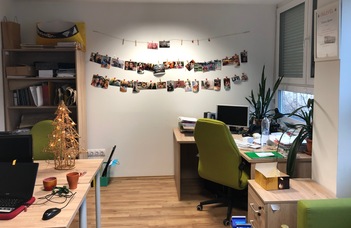Introduction of the Research Group

Members of the research group have been participating in different studies about teachers and teacher education for decades. We consider social responsibility a priority; we pay special attention to support innovations through utilizing our research findings, thus incorporating them into professional practice. In order to successfully achieve that we apply our previous studies to outline the directions of further research, connecting new results with already existing research directions. Besides influencing the topic-related processes in education, we possess significant professional experience in the development of certain subsystems of higher education, the training of educators and the studies on teachers’ views: we actively participate in the relating research-innovation processes.
During the previous years, our research group has been focusing on the professional knowledge and thinking of teachers, a topic that has had several milestones: 1) BaBE research (Research on the introduction of the Bachelor education programme) (2006-2011); 2) LEO research (Systematic development of services in higher education) (2009-2015); 3) PEK (Teachers being active in innovation and development and the professional capital of schools) (2016).
The various research interests and the complexity of the professional experience of the members have made it possible to study, interpret and integrate the certain elements of the topic of teachers based on the theoretical framework of continuous professional development. As part of our research projects we mainly conduct interdisciplinary ground and applied research and methodological developments, while also carrying out quantitative, qualitative and mixed studies, innovations and action-research supporting research, development and education. The members of the research group are drawn from instructors and researchers of the Institute of Education, PhD students and demonstrators supporting the different projects. We deem the actual integration of research and innovation crucial at the university as well, so we aim to involve BA and MA students in some of our studies. Besides the cooperation within the institute, we have managed to maintain a strong professional relationship with schools, such as innovative teachers interested in certain studies and the development of their professional practice.
The educational portfolio of the Faculty and the Institute of Education, especially its significant role in the country’s teacher education also help us determining the research directions of our studies. Due to these, the research group identifies the following research topics as priorities:
1.Research on teachers, especially studies connected to the continuous professional development of teachers:
- the investigation of the models of continuous professional development (CPD) on the levels of the educational system, the school organizations and the individuals;
- the reflective thinking and practice of teachers;
- the individual interpretation of the model of master teachers (professional development, innovation, research, knowledge sharing) in the master-programs of teachers;
- the characteristics of individual learning paths and forms;
- correlation between individual learning paths and forms and learning outcomes¬;
- correlation between changes in competences and views and different phases of professional development;
- participation in professional communities;
- interpretation of formal and informal learning paths within the organization;
- representing individual knowledge within the organization.
2. Research on organization learning processes:
- the characteristics of organizational culture and learning: peer support, shared values, decision making, risk taking, trust, openness, relation with parents, leadership, communication, socialization and the history of the organization;
- the characteristics, goals and connections of learning communities;
- the features of leadership: interpretation and forms of support;
- role-interpretation of practice and partner schools within education programs, the duration, function and expectations of practice;
- human and social capital of schools;
- action-research, qualitative research (e.g. metaphor), organizational research;
- border crossing in organizational learning;
- the role of leadership in organizational learning;
- cooperative learning within the organization.
3. Research on pre-service and in-service teacher education:
- comparative studies of teacher education programs;
- comparative studies in-service teacher education programs;
- development of teacher competences in teacher education;
- interpretation of the expectations of the educational government in the programs of master-teachers;
- systematically defined characteristics of teacher education: interpretation of teacher-role and personal responsibility, goals, processes, forms and outcomes of learning;
- elements of teacher competences in the expectations of the educational government;
- education programs and expected outcomes of formal education programs.
4. Modern, innovative learning environments:
- learning environments supporting the development of teachers;
- online learning environments;
- digital learning outcomes and interpretation of expectations in teacher education.

